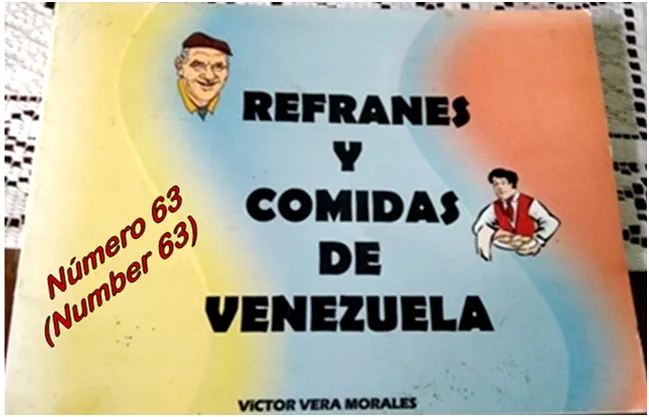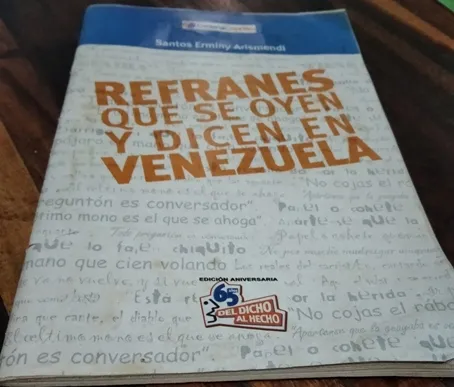ESPAÑOL
Saludos, hoy 8 de Junio 2023. Ya hay lluvias en Venezuela, a veces en exceso, pero realmente ha sido de gran ayuda para plantas y animales. Hoy regreso para ofrecerles otro número de mi seriado Cinco Sabios Refranes Venezolanos, publicaciones en las que entrego un grupo de refranes con su respectivo análisis y significado, y mi intención es ayudar a conservar esta valiosa expresión cultural.
A veces estoy oyendo música de mi país, y he notado algo curioso: Sin importar el género, muchas de las canciones tienen uno que otro refrán en sus letras, claro, esto es más notorio cuando se trata de música folklórica como el joropo, pues en estas melodías es más común. En ocasiones me da mucha risa, por la ocurrencia y lo ingenioso de los refranes, y creo que esto es una característica de mi país.
Nuevamente señalo que estos refranes no son de mi autoría, sino que los tomo de mis conversaciones, de mi observación de otras personas, y también reviso libros específicos, como los que cito en la sección de Bibliografía. Los refranes no tienen autores definidos, digamos que son producto y a la vez de propiedad universal, y si bien hay refranes muy regionales o locales, hay otros más globales. Sin embargo, el análisis de cada uno de ellos, sí es de mi autoría. Si deseas conocer más refranes, además de los que leerás en este post, puedes dirigirte al link que está al final para que puedas ver el número anterior de este seriado.

 1) “Lo barato, sale caro.”
1) “Lo barato, sale caro.”
Este refrán no sé si se usará en muchos países, creo que sí, tal vez con otras palabras. Ahora bien, quizás no siempre ocurra, pero en muchas ocasiones cuando compramos algo que sea de un precio menor al promedio, se deteriora pronto y no tiene garantía, por lo que entonces debemos comprarlo o invertir nuevamente en ello, y hacer doble gasto. Esto no sólo se aplica a objetos, sino también a servicios.
2) “La ociosidad es la madre de todos los vicios.”
También es un refrán universal, que indica que si una persona está sin trabajar o sin ocupar su tiempo y mente de manera productiva, es muy probable que esa inactividad le lleve por malos caminos, cayendo en vicios y en prácticas no adecuadas.
3) “La lengua del mal amigo, corta más que el cuchillo.”
Cuando alguien a quien considerábamos anteriormente nuestro amigo, nos decepciona, nos desilusiona, y de paso saca la lengua a pasear, o sea habla a cualquier persona de nuestros asuntos, y adicionalmente nos calumnia, el desengaño es mayor, es doble.
4) “La mejor palabra, es la que no se dice.”
A veces no somos conscientes de lo que hablamos, por eso es que este refrán se usa para aconsejar prudencia al hablar, porque si no decimos algo indebido, evitamos perjudicarnos o perjudicar a otros.
5) “Las palabras que no se dicen, son las que más hieren.”
Con este refrán se indica que la indiferencia y el silencio, son más despectivos que cualquier palabra, y quizás, menos desgastantes.
 ENGLISH
ENGLISH
Greetings, today June 8, 2023. There is already rain in Venezuela, sometimes excessively, but it has really been a great help for plants and animals. Today I return to offer you another issue of my series Five Wise Venezuelan Sayings, publications in which I provide a group of sayings with their respective analysis and meaning, and my intention is to help preserve this valuable cultural expression.
Sometimes I am listening to music from my country, and I have noticed something curious: Regardless of the genre, many of the songs have one or two sayings in their lyrics, of course, this is more noticeable when it comes to folk music like joropo, well in these melodies it is more common. Sometimes it makes me laugh a lot, due to the occurrence and ingenuity of the proverbs, and I think that this is a characteristic of my country.
Once again I point out that these sayings are not mine, but I take them from my conversations, from my observation of other people, and I also take them from specific books, like the ones I quote in the Bibliography section. The proverbs do not have defined authors, let's say that they are a product and at the same time universally owned, and although there are very regional or local proverbs, there are others that are more global. However, the analysis of each of them is my own. If you want to know more sayings, in addition to the ones you will read in this post, you can go to the link at the end so you can see the previous number of this series.

 1) “Cheap is expensive.”
1) “Cheap is expensive.”
I don't know if this saying will be used in many countries, I think so, perhaps with other words. Now, it may not always happen, but on many occasions when we buy something that is less than average in price, it deteriorates soon and has no guarantee, so we must then buy it or invest again in it, and spend twice as much. This not only applies to objects, but also to services.
2) “Idleness is the mother of all vices.”
It is also a universal saying, which indicates that if a person is without work or without occupying his time and mind in a productive way, it is very likely that this inactivity will lead him down bad paths, falling into vices and inappropriate practices.
3) “The bad friend's tongue cuts more than the knife."
When someone whom we previously considered our friend disappoints us, and incidentally sticks out his tongue for a walk, that is, he talks to anyone about our affairs, and additionally slanders us, the disappointment is greater, it is double.
4) “The best word is the one that is not said.”
Sometimes we are not aware of what we are talking about, that is why this saying is used to advise prudence when speaking, because if we do not say something wrong, we avoid harming ourselves or others.
5) “The words that are not said are the ones that hurt the most."
This saying indicates that indifference and silence are more contemptuous than any word, and perhaps less exhausting.
 Queridos lectores, seguidamente coloco el link del número 62, por si lo quieren leer:
Queridos lectores, seguidamente coloco el link del número 62, por si lo quieren leer:
Dear readers, I will post the links to number 62 below, in case you want to read it:
Fuentes Bibliográficas / Bibliographical sources:
Víctor Vera Morales. (Agosto 2004). Refranes y Comidas de Venezuela. Editado por el Instituto Municipal de Publicaciones de la Alcaldía de Caracas.
Santos Erminy Arismendi. (2006). Refranes que se oyen y dicen en Venezuela. Cadena Capriles, Caracas. Venezuela.
Fuentes de las imágenes / Image sources:
- Fotos de mi autoría, tomada con un teléfono REDMI 8A, intervenida con WordArt / Photos of my authorship, taken with a REDMI 8A telephone, intervened with WordArt.
- Los diseños incluidos en esta publicación, han sido elaborados por mi persona con la aplicación CANVA / The designs included in this publication has been made by me with the CANVA application.
En caso de que se requiera emplear el contenido o imágenes de este post y de mis otras publicaciones, agradecería se hiciera referencia a mi autoría (Fabiola Martínez) y se citara el link correspondiente. Gracias.
In the event that it is required to use the content or images of this post and my other publications, I would be grateful if my authorship (Fabiola Martínez) was made and the corresponding link was cited. Thank you.

 Delegations welcome!
Find our community
Curation Trail
Delegations welcome!
Find our community
Curation Trail


Find our community Delegations welcome! / Curation Trail







 Delegations welcome!
Delegations welcome!


